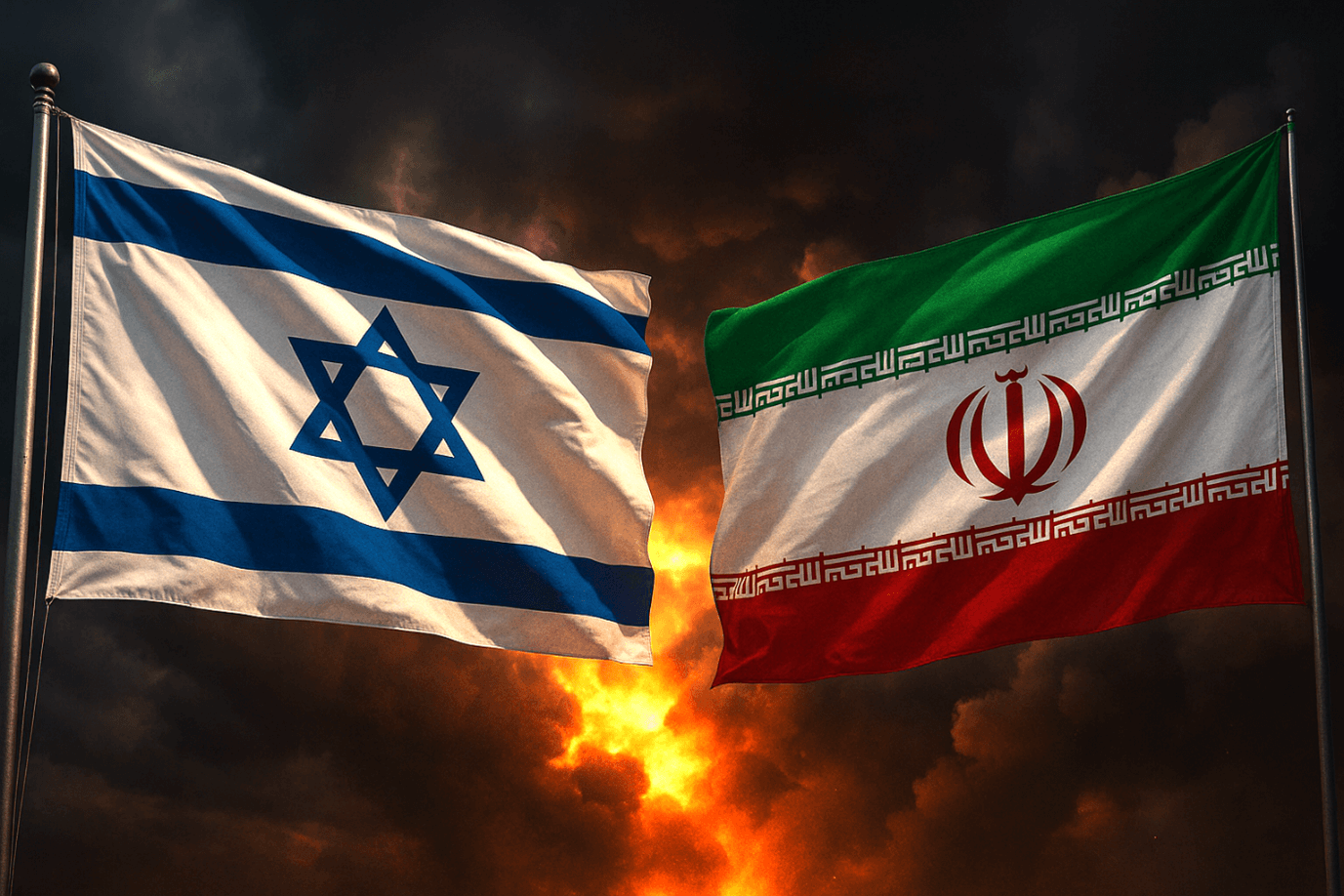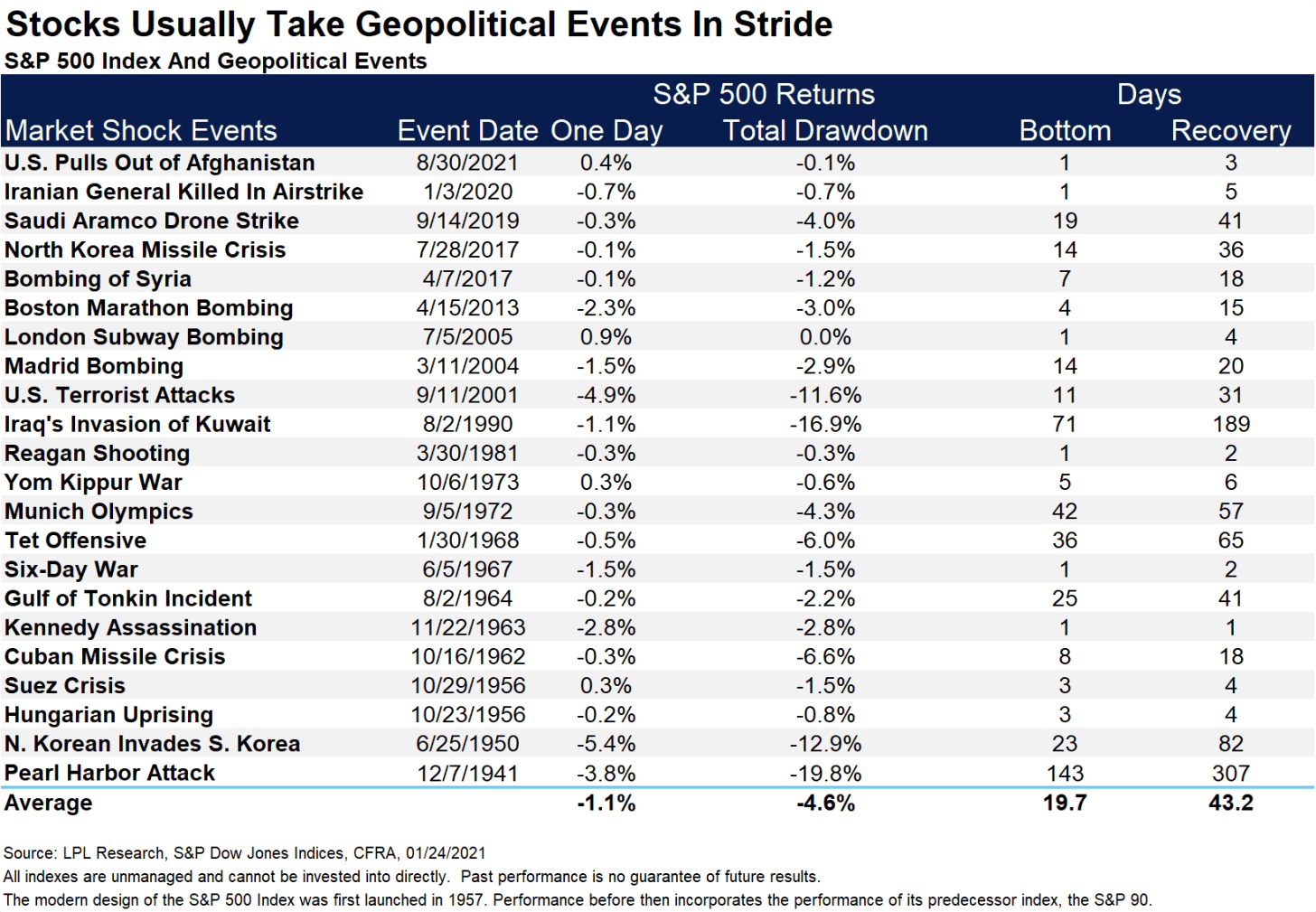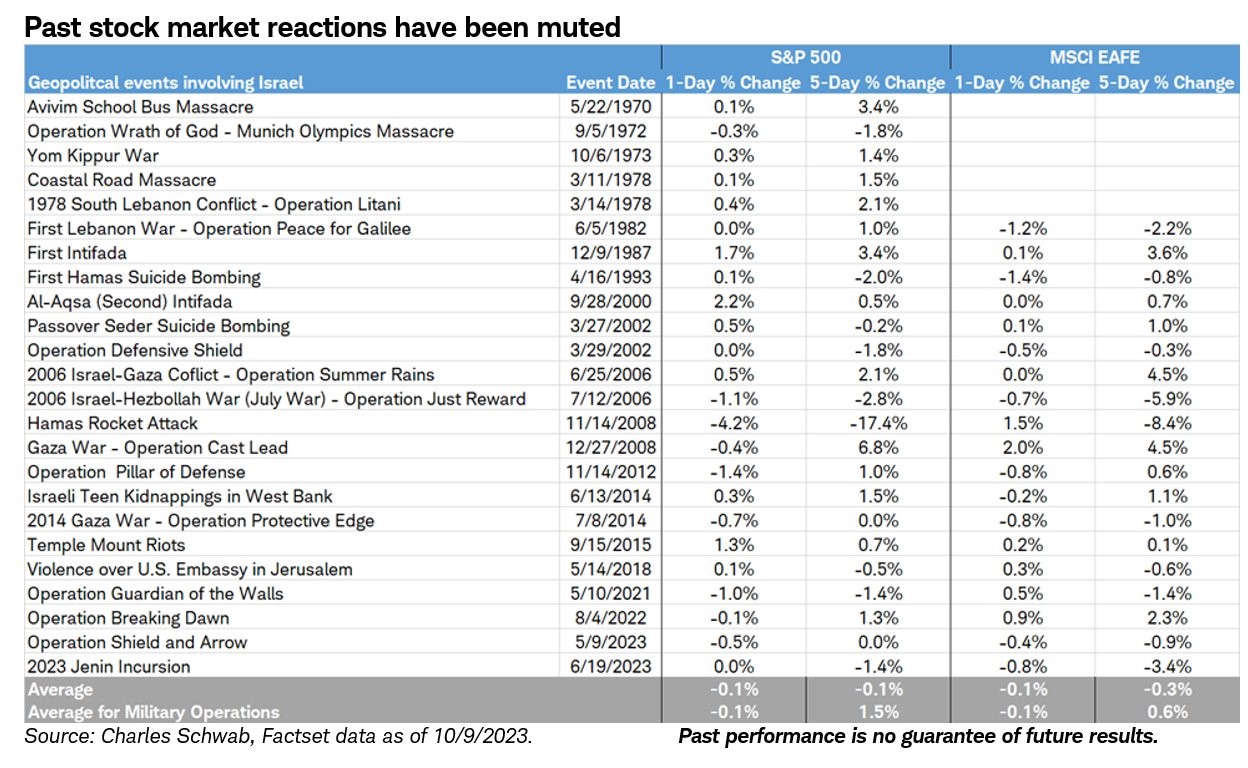All of this has happened before, and it will all happen again.
—J.M. Barrie
It’s like clockwork, isn’t it?
Every time a new crisis erupts in the Middle East, a feeling of apocalyptic doom and gloom descends upon us all.
That’s when I start getting phone calls from our Managed Account clients.
They are concerned. They are worried. They are anxious.
They ask me: ‘Is this it? Is this the end?’
My answer: ‘No, I don’t think this is the end of the story. I think this is just the continuation of an existing one.’

Source: Image generated by OpenAI’s DALL-E
Yes, tensions are boiling over with Israel and Iran. All the news coverage is looking very dramatic, very frightening.
- Of course, there’s no hiding the fact that we are now living in an age of angertainment. Rage-baiting. Drama-queening. It’s never been easier to transmit anxiety at the speed of light, thanks to the relentless nature of our 24/7 media cycle.
- But is the geopolitical situation actually as disastrous as it looks? Well, given the circumstances, I think it can be helpful for us to take a breath. Then zoom out. Then look at the big picture. Here’s why I think it matters.
- Since its founding in 1948, Israel has fought 17 official wars over 77 years. I’ve done the math here. This actually works out to one war every 4.5 years.
- But watch out. That figure doesn’t include the many secret wars that Israel has waged under the radar. These are clandestine operations. Blacker than black. Most of these ops will never appear in the headlines.
- In his book Rise and Kill First, Israeli journalist Ronen Bergman reveals that his country has carried out no less than 2,700 targeted assassinations. This means that Israel has assassinated more people than any other Western nation since World War II.
Yes, Israel is a secular democracy, but its foreign policy is inspired by religious doctrine. The Babylonian Talmud spells it out like this: ‘If someone comes to kill you, rise up and kill him first.’
- Does this sound extreme? Radical? Overzealous?
- Well, you have to remember. Israel has a singular national obsession: to prevent a second Holocaust. The collective trauma of the Jewish people serves as propulsive fuel. Driving Israel to take actions that are shockingly uncompromising and intensely controversial. It does so regardless of global opinion.
Here are two examples from the past that I believe are worth looking at:
- In 1962, the Israeli Mossad carried out Operation Damocles. This was a campaign of bombings, shootings, and kidnappings in Egypt. The goal? To terrify the German scientists working in the country. Convincing them to give up their posts and return home.
- Why was this important? Well, you see, at the time, these scientists were working on a missile programme for Egyptian dictator Gamal Abdel Nasser. The Israelis feared that if these missiles had gone operational, they would be used to carry radioactive warheads. Obviously, the Israelis decided that they could not tolerate this threat. So they moved quickly to eliminate it.
- Of course, this wouldn’t be the last time that Israel had to take extreme measures. Later, in 1981, a new threat would emerge. And once again, decisive action was required. That’s when the Israeli Air Force carried out Operation Babylon. Their jets swooped into Iraq. Executing a pre-emptive strike. Bombing the Osirak nuclear reactor.
- At the time, the Israelis suspected that Saddam Hussein was trying to set up a nuclear-weapons programme. This was a nightmare scenario. So, once again, the Israelis decided they couldn’t tolerate it. So they moved urgently to squash the problem.
Well, you are starting to see a recurring theme here, aren’t you? Every time Israel perceives an existential threat, it resorts to using overwhelming force to neutralise it.
- Now, in this regard, Israel is no ordinary country — and the Israelis are no ordinary people. For them, national security is their prime directive. It must always override any other concern.
- In the words of historian Simon Schama: ‘The Jewish imagination is paranoia confirmed by history.’
Of course, this is where the controversy arises, isn’t it? I’ve observed that the ideological divide between the people who support Israel and those who oppose it has never been more polarised.
- For example, if you’re a right-wing religious nationalist, you will tend to believe that Israel’s actions are always justified. The sacred covenant of the Jewish people to have a nation-state in their ancestral homeland is beyond question. Their safety must be upheld. No price is too high to pay to achieve that goal.
- However, if you’re a left-wing secular globalist, you will tend to disapprove of almost anything Israel does. You might call Israel a settler-colonialist state. A rogue nation. Disenfranchising local Arabs with trigger-happy policies. For this reason, you are shaking your fist, and you want to see Israel punished by international boycotts and sanctions.
Of course, I’m not here to debate the merits of anyone’s ideology. I’m not here to challenge anyone’s morality. Instead, I want to talk only about the facts.
- It’s clear that Israel is no stranger to turbulence and upheaval. There has never been a sustained period of peace in the land. Violent flashpoints erupt regularly.
- Is this tragic? Yes. But it’s important to understand that fighting and dying is a way of life in the Middle East. After all, this is the ancient birthplace of fanatics, terrorists, and assassins.
- The legacy of trauma and revenge is hardwired into the region’s DNA. All this has happened before. All this will happen again.
For this reason, geopolitical trouble tends not to sway the stock market for very long. If anything, the market has proven itself to be pretty good at digesting the short-term impact of a crisis, then pricing ahead for the long-term.
- Now, I want to give you a visual example of what this means. Here’s a chart examining the impact of global fear events over an 80-year time span:

Source: Financial Samurai
Also, it’s worth diving a bit deeper.
- Here’s another chart examining the impact of Israel-only fear events over a 53-year time span:

Source: Jeffrey Kleintop / X
It’s revealing, isn’t it? Short-term jitters tend to have no bearing over long-term performance. So, ultimately, here’s what investors should be mindful of:
- When it comes to the stock market, emotions are best kept in check. The temptation to click ‘SELL’ during a crisis may be strong. But fund manager Peter Lynch believes it’s the wrong move. He says: ‘Far more money has been lost by investors trying to anticipate corrections, than lost in the corrections themselves.’
- Yes, you may see some volatility with assets that are perceived to be riskier. For example, stocks related to travel and tourism may experience a sell-off. Also, the price of oil and gold may experience a bounce as speculators make a bet on them.
- However, beyond Israel and Iran, the market is actually more concerned with longer-term issues: corporate earnings, inflationary pressure, and interest rates. Indeed, moving forward, this is what will drive the agenda for most investors.
- While past performance is no guarantee of the future, investors can be hopeful that this storm will eventually pass, giving way to brighter days ahead. The trick is to look beyond the fear.
So, are you still feeling concerned? Still feeling anxious?
- Well, if you are, you can always reach out to me at [email protected]
- I can’t give you personal financial advice. However, I’m always happy to have a chat with you about the state of the world.
- Meanwhile, stay resilient. Keep investing. This is the name of the game.
Regards,
John Ling
Analyst, Wealth Morning
(This article is the author’s personal opinion and commentary only. It is general in nature and should not be construed as any financial or investment advice. Past performance does not indicate the future. Wealth Morning offers Managed Account Services for Wholesale or Eligible Investors as defined in the Financial Markets Conduct Act 2013.)





John is the Chief Investment Officer at Wealth Morning. His responsibilities include trading, client service, and compliance. He is an experienced investor and portfolio manager, trading both on his own account and assisting with high net-worth clients. In addition to contributing financial and geopolitical articles to this site, John is a bestselling author in his own right. His international thrillers have appeared on the USA Today and Amazon bestseller lists.